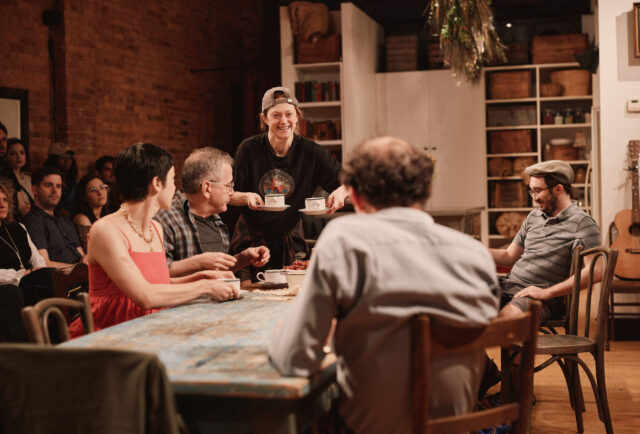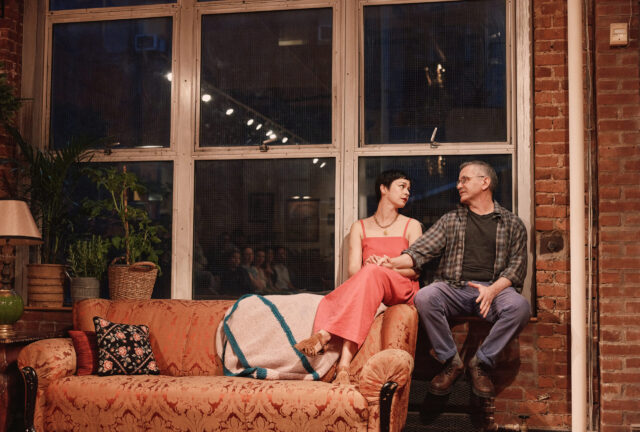
Jack Serio’s adaptation of Anton Chekhov’s Uncle Vanya is set in a private Flatiron loft (photo by Emilio Madrid)
UNCLE VANYA
Private Flatiron loft
Wednesday – Monday through July 16, $58.54-$247.54
Extension: August 8 – September 3, $58.37-$275.29 ($39 lottery)
vanyanyc.com
Jack Serio’s superb production of Anton Chekhov’s Uncle Vanya is the theatrical event of the summer, and the one likely to be seen by the fewest people. It’s billed as being “hyper-intimate,” and it lives up to that description in just about every way.
Tickets were released without much fanfare on May 17 and sold out almost immediately; a mere forty seats were available for each of sixteen performances at an undisclosed private loft in the Flatiron District. The day before my show, I got an email advising me of the exact address and letting me know that “seating is general admission on a mix of chairs and comfortable high-back stools.” Because there is only one bathroom inside, we were told, “Please plan accordingly and use the restroom prior to your arrival if possible.” We were also warned not to come earlier than the designated time. “Please do not arrive prior to this time, as we will not be able to admit you into the building. We also cannot allow guests to congregate outside the building prior to or after the performance. Remember, this is a residential building and we’d like to be respectful to our neighbors.”
It made it all seem wonderfully secretive, as if we were part of some kind of clandestine club. There is no signage at the building; I was fully expecting there to be a hush-hush knock before I was led to a tiny elevator that can fit only a few people at a time. We got off at the second floor — stairs are not an option, up or down — where we were met with a large sign with information about the cast and creative team, so I knew I was in the right place. (Note that although the run is sold out, rush lottery tickets are available for each performance.)
The main space is a narrow, rectangular room with two farm tables pushed together at the center. The audience sits on either side, in the first row of chairs or the second row of taller high-back stools. The night I went, more than half the seats already had names on them, so there was a bit of confusion for those whose names were not taped to a seat; several groups of two or three ended up sitting apart from one another because of the scarcity of available, unmarked chairs. (The pricing structure ranges from general admission to reserved, so if you purchased the former, be sure to get there early.) Meanwhile, songs by Bob Dylan and Neil Young played in the background.

Ványa (David Cromer) can’t hide his love for Yeléna (Julia Chan) in hyper-intimate Chekhov production (photo by Emilio Madrid)
Walt Spangler’s cozy set features a working kitchen at one end and a couch beneath a window looking out at the courtyard at the other, with double metal doors leading to the fire escape, which is used as an entrance and exit throughout the show. Stacey Derosier’s lighting consists of two rows of track lights and a handful of carefully placed small stage lights, with flashlights and candles that cast mysterious glows. Carrie Mossman’s props include mirrors and old family photos on exposed brick walls and on the piano in one corner. Christopher Darbassie opts for a naturalistic sound design, which, the night I went, was enhanced by real rain and thunder. Ricky Reynoso’s costumes are contemporary but not fancy, save for Yeléna’s chic dresses, and several characters walk around in socks, slippers, or bare feet.
Serio uses Paul Schmidt’s 1999 translation, which felt fresh and vibrant to me, perhaps because all the recent productions of the play I’ve seen have been radical reimaginings or mashups (Vanya and Sonia and Masha and Spike, New Saloon’s Minor Character: Six Translations of Uncle Vanya at the Same Time, Aaron Posner’s Life Sucks.) in addition to Richard Nelson’s 2018 adaptation for the Hunter Theater Project.
At an undefined time and location — although there are no cell phones — a group of friends and relatives have gathered at a country farm run by Ványa (David Cromer) and his niece, Sónya (Marin Ireland). Sónya’s father, the elderly, ailing professor Alexánder Serebriakóv (Bill Irwin), has arrived from the city with his second wife, the much younger and elegant Yeléna (Julia Chan), with plans on what to do with the estate they are tiring of. Both Ványa and Ástrov (Will Brill), a local doctor, are in love with Yeléna and not afraid to show it. Sónya, whose mother, Ványa’s sister, died many years before, is obsessed with Ástrov but too embarrassed to tell him, as she is afraid that she is too plain for him. Mrs. Voinítsky (Ann McDonough), Sónya’s grandmother, spends most of her time reading, drinking tea, and pontificating on such subjects as principles and change. Telégin (Will Dagger), known as Waffles, lives on the farm and helps out, still faithful to his wife, who left him for another man the day after they were married. And the longtime family nurse, Marína (Virginia Wing), knits and ruminates on the past.
Over the course of a few days, relationships entangle, secret loves are revealed, and one of the most famous gunshots in theater history echoes through the room.

Ástrov (Will Brill) can’t hide his love for Yeléna (Julia Chan) in Uncle Vanya (photo by Emilio Madrid)
Serio (This Beautiful Future, On Set with Theda Bara) maintains a fine line between intimate and immersive or interactive in the two-and-a-half-hour show (with intermission). Although the actors are almost always only a few feet away from the audience, they don’t make eye contact; it’s almost like a fly-on-the-wall documentary of a family falling apart, with no idea how to save itself. Cromer (The Waverly Gallery, A Raisin in the Sun) portrays Ványa as a broken man who seems to have already given up on life, essentially sleepwalking through the days, resigned to never be content. “Oh, God, my mind’s a mess,” he wails.
Brill (A Case for the Existence of God, Oklahoma!) imbues Ástrov with an innate selfishness that is the yin to Ványa’s yang. In this space, Ástrov’s environmentalism is even more prophetic than usual. “We were born with the ability to reason and the power to create and be fruitful, but until now all we’ve done is destroy whatever we see,” he says, talking about more than just trees, an ever-present pencil tucked behind one ear. “The forests are disappearing one by one, the rivers are polluted, wildlife is becoming extinct, the climate is changing for the worse, every day the planet gets poorer and uglier. It’s a disaster!”
You can feel the professor’s pain as Irwin (Old Hats, On Beckett) shuffles across the space, failing to recognize how his decisions impact everyone else, especially Ványa, who says of him, “A retired professor, a has-been, a moldy mackerel with a college degree. He has gout, rheumatism, migraines, his liver’s swollen with jealousy and envy.” Chan (2:22 A Ghost Story, The Great Canadian Baking Show) is alluring as Yeléna, who is well aware of her power over men. Dagger (The Antelope Party, Corsicana) offers welcome interludes as Telégin plays his acoustic guitar.

Sónya (Marin Ireland) can’t hide her love for Ástrov (Will Brill) in Jack Serio’s Uncle Vanya (photo by Emilio Madrid)
But Ireland (On the Exhale, Marie Antoinette), a New York City treasure, steals the show as Sónya, an ingénue who thinks she is ugly and undeserving of happiness. Telling Yeléna of her feelings for Ástrov, she opines, “It hurts so much! And it’s all so hopeless. It’s completely hopeless!” Ireland makes full use of the set; she sits on top of the couch and looks out the window longingly. She jumps on the kitchen island and speaks to Ástrov by tender candlelight. Wearing a baseball cap backward, she contorts her face and body in mesmerizing ways that capture the heartache in her soul. Sónya just wants to love, and be loved; she is the most human character in the play, the one most of us can identify with the closest.
The intimacy — or hyper-intimacy, if you will — allows us to understand the people who populate this farm in a deeply profound way. They exist in a world that is passing them by, stirring our compassion and inspiring us to wish to avoid the same fate.
[Ed. note: The play is being brought back August 8 – September 3 for an encore run, with a few cast changes: Thomas Jay Ryan (Dance Nation, Eureka Day) is taking over as Serebriakóv, with Dario Ladani Sanchez (Juliet & Romeo, a wake for david’s fucked-up face) as Yefim.]
[Mark Rifkin is a Brooklyn-born, Manhattan-based writer and editor; you can follow him on Substack here.]